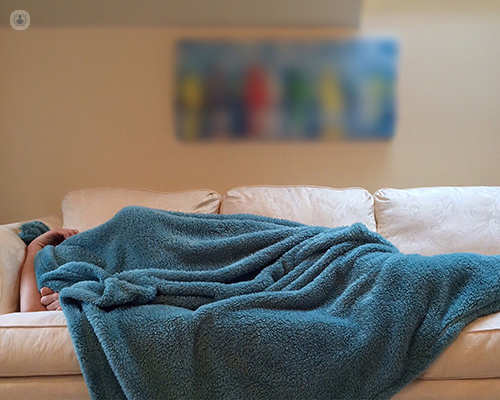Recovering from a tonsillectomy
Written in association with:The tonsils are glands that sit on either side towards the back of the throat. They are made of lymphoid tissue and play a role in fighting infections. Sometimes they can cause problems and require removal. This procedure is called a tonsillectomy. Tonsillectomy is usually performed as a day case operation. Mr Julian Hamann, a leading otolaryngologist, explains what to expect from tonsillectomy recovery.

What is the recovery from a tonsillectomy like?
After your procedure you will be taken from the operating theatre to the recovery room where you wake up. You need to stay in the hospital for 6 hours before you can go home.
You should arrange to have two weeks off work or other commitments and it is best to avoid crowded places, to minimise the chance of catching a cough or cold. Some discomfort is normal after tonsillectomy, and can be the case for two weeks. The soreness usually increases slightly for the first few days following surgery, before gradually getting better. Many patients have earache after five to seven days. This is due to the fact that the tonsils and ears share a nerve supply, and is called a ‘referred pain’.
A day or two after the operation, you will notice some white material developing over the tonsil beds. This is a normal part of the healing process, and does not mean you have an infection. Many people find they have bad breath for several days after the operation.
You should eat a normal diet after surgery and whilst you may not feel as hungry as usual, you should try and eat three times a day, and drink plenty of fluids.
When can I go back to work / school?
Most people can go back to work ten days to two weeks after the operation. It is advisable to keep two weeks free from any work or social commitments for two weeks after tonsillectomy. It is important that you do not exert yourself or undertake vigorous exercise for two weeks after surgery.
Can I brush my teeth after tonsillectomy?
Yes – dental hygiene is important after surgery. You should brush your teeth as normal as this can also help to reduce the chances of infection.
Can I smoke after tonsillectomy?
Smoking causes inflammation of the upper airways and impairs the body’s ability to heal. Recovery from tonsillectomy will take longer, and the risks of surgery are increased. For these reasons, it is advisable not to smoke either before or after tonsillectomy. Even one or two cigarettes a day will have this effect. Stopping smoking can be difficult. If this is the case, nicotine patches can be a helpful alternative before and after tonsillectomy.
What should I do if…
My throat is very sore and I can’t swallow anything?
This is an unusual problem, and might be because you have developed an infection. You will need to be seen and have your throat examined. Sometimes stronger painkillers and antibiotics are required. If you are not able to swallow fluids, a hospital admission is sometimes required.
I have coughed up some blood?
It is common to have blood-stained saliva for the first 12 hours following surgery. If you have any bleeding beyond this point, or are coughing up fresh blood or clots, please attend your nearest Accident and Emergency department to have your throat examined. Most cases of bleeding after tonsillectomy are treated with mouthwashes and antibiotics and rarely a further trip to the operating theatre is needed to stop the bleeding.
If you would like to find out more about tonsillectomy and recovering from tonsillectomy, make an appointment with a specialist.



